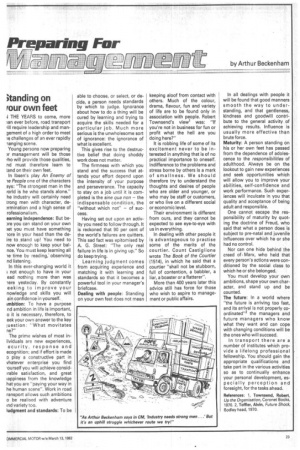Aanding on four own feet
Page 19

If you've noticed an error in this article please click here to report it so we can fix it.
.1 THE YEARS to come, more ian ever before, road. transport Fill require leadership and mangement of a high order to meet le challenges of an ever rapidly langing scene.
Young persons now preparing w management will be those rho will provide those qualities, nd must therefore learn to and on their own feet.
In lbsen's play An Enemy of le People one of the characters ays: "The strongest man in the rorld is he who stands alone." he industry will certainly need trong men with character, dewmination and a high sense of rofessional ism.
earning independence: But bewe you can stand on your own !let you must have something lore in your head than the deire to ,stand up! You need to now enough to keep your balnce. You must keep learning all le time by reading, observing nd listening.
In this ever-changing world it not enough to have in your ead nothing more than was iere yesteday. By constantly eeking to improve your nowledge and skills you will am n confidence in yourself..
kmbition: To have a purpose nd ambition in life is important, o it is necessary, therefore, to eek your own answer to the key [uestion: "What rnovitates le?"
The prime wishes of most inlividuals are new experiences, ecurity, response and ecognition; and if effort is made o play a constructive part in vhatever enterprise you find 'ourself you will achieve consid!rable satisfaction, and great iappiness from the knowledge hat you are "paying your way in he human scene". Work in road ransport allows such ambitions o be realised with adventure Ind variety too, ludgment and standards: To be able to choose, or select, or decide, a person needs standards by which to judge. Ignorance about how to do a thing will be cured by learning and trying to acquire the skills needed for a particular job. Much more serious is the unwholesome sort of ignorance: the ignorance of what is excellent.
This gives rise to the destructive belief that doing shoddy work does not matter.
The firmness with which you stand and the success that attends your effort depend upon the intensity of your purpose and perseverance. The capacity to stay on a job until it is completed is the sine qua non — the indispensable condition, the "without which not" — of success.
Having set out upon an activity you need to follow through. It is reckoned that 90 per cent of the world's failures are quitters. This sad fact was epitomised by A. G. Street: "The only real failure in life is in giving up." So do keep trying.
Learning judgment comes from acquiring experience and matching it with learning and standards so that it becomes a powerful tool in your manager's briefcase.
Dealing with people: Standing on your own feet does not mean
keeping aloof from contact with others. Much of the colour, drama, flavour, fun and variety of life are to be found only in association with people. Robert Townsend's viewl was: "If you're not in business for fun or profit what the hell are you doing here?"
It is robbing life of some of its excitement never to be interested in anything that is of no practical importance to oneself. Indifference to the problems and stress borne by others is a mark of smallness. We should therefore try to understand the thoughts and desires of people who are older and younger, or who may be staff or customers, or who live on a different social or economic level.
Their environment is different from ours, and they cannot be expected to see eye-to-eye with us in everything.
In dealing with other people it is advantageous to practise some of the merits of the courtier. Count Castiglione wrote The Book of the Courtier 0514), in which he said that a courtier "shall not be stubborn, full of contention, a babbler, a liar, a boaster or a flatterer".
More than 400 years later this advice still has force for those who wish to aspire to management or public affairs. In all dealings with people it will be found that good manners smooth the way to understanding, and that gentleness, kindness and goodwill contribute to the general activity of achieving results. Influence is usually more effective than brute force.
Maturity: A person standing on his or her own feet has passed from the dependence of adolescence to the responsibilities of adulthood. Always be on the lookout to gain new experiences and seek opportunities which will allow you to improve your abilities, self-confidence and work performance. Such experiences will inculcate in you that quality and acceptance of being adult and responsible.
One cannot escape the responsibility of maturity by quoting the doctrine of Freud, who said that what a person does is subject to pre-natal and juvenile influences over which he or she had no control.
Nor can one hide behind the creed of Marx, who held that every person's actions were conditioned by the social class to which he or she belonged.
You must develop your own ambitions, shape your own character, and stand up and be counted.
The future: In a world where "the future is arriving too fast, and its arrival is not properly coordinated"2 the managers and future managers who know what they want and can cope with changing conditions will be the ones who will succeed.
In transport there are a number of institutes which provide a lifelong professional fellowship. You should gain the appropriate qualifications and take part in the various activities so as to continually enhance your personal development, especially perception and foresight, for the tasks ahead.
References: 1, Townsend, Robert, Up the Organisation, Coronet Books, 1970. 2, Toffler, Alvin, Future Shock, Bodley head, 1970.


































































